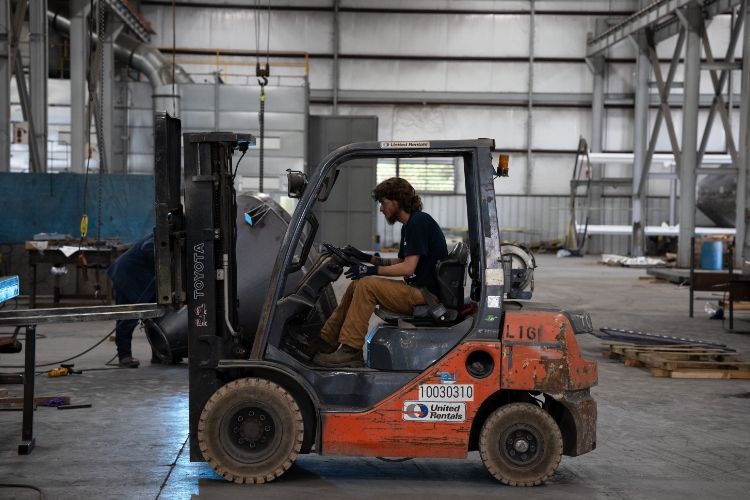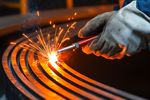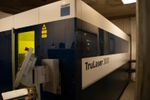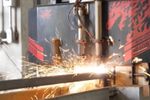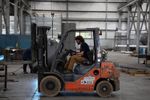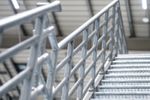Whether you’re moving automotive parts, mining byproducts, or distributing feed and grain, the way you transport your goods is just as important as producing them. You may already store your materials in custom-fabricated, bulk storage bins such as steel hoppers, tanks, or silos to safeguard the materials from the elements. How your material handling solutions are fabricated is equally important for protecting valuable products.
Fortunately, Southern Metal Fabricators (SMF) can serve as your quality control and efficiency partner for your material handling needs. Our custom metal fabrication and structural steel processing services can help you safeguard how you transport your materials and products.
This blog will examine three types of custom metal fabrications: 1) custom carts and totes, 2) conveyor bridge trusses, and 3) steel ladles, that can help you increase your material handling efficiency.
Bumper Cart and Tote Metal Fabrications
Bumper carts and totes are integral in transporting components and parts, especially within the automotive industry. Your metal fabrication partner can create a cart or tote design for your industry processes. If you need a new cart or tote, here are some fabrication considerations that can impact your product quality and material handling processes.
Do All the Parts Fit?
Optimizing your bumper cart or tote design can help you improve plant efficiency and worker well-being. For example, the bumper cart’s metal fabrication design can ensure that all the parts fit perfectly and don’t hang off the cart — protecting materials and products while streamlining loading and unloading. Your metal fabrication partner can custom-design a cart with your required specifications to further reduce the possibility of error and/or injury.
Metal Forming for Seamless Assembly
Depending on your facility’s needs, SMF can incorporate heavy-duty wheels into your custom tote or cart design, and our experts have experience designing for both free-rolling and trolley systems. Once designs are approved, we cut the metal, form it to your exact requirements, and hand it off to our master welders for final assembly.
These in-house metal forming capabilities include:
- Metal Bending: Our four mechanical and CNC hydraulic press brakes can bend metal plates up to 12' long to any angle. The largest, 400-ton press brake can take on a 3/4″ steel plate while our 10-ton brake handles more delicate projects.
- Steel Punching: Our 50-ton hydraulic web and flange beam punches are ideal for heavy steel punching. For more exact punching, we prefer our CNC 30-ton Strippit punch press.
- Sheet Metal Rolling: We have three roller machines for rolling plates up to 10' long, including one that can take on 5/8″ steel plate, rolling it into smooth cylinders for projects such as bulk oil tanks and round ductwork. Our two-angle rollers can bend angled metal on a curve.
- Custom Metal Forming: Whether your metal fabrication project requires bending, rolling, shearing, or punching — our three, multi-function ironworkers can help you manage it all — including metal notching if required.
Metal Fabrication Quality Assurance
After fabricating each bumper cart or tote and fully assembling it, SMF’s quality assurance experts check over each component to ensure that there are no defects. This step is especially important for industrial totes. This is because industrial totes house waste and scraps and require strict conformity to safety procedures for preventing leaks, fumes, and other dangers to workers and your facility.
Conveyor Bridge Trusses
For mining operations, conveyor bridge trusses are essential for removing waste (known as overburden) from mines and transporting it out to the spoil bank via an elevated track. Because every mine is different, your metal fabrication partner should make sure your new conveyor bridge will exactly match the layout and dimensions of both your mine and your mining equipment.
Getting the Right Fabrication Design
As your metal fabrication partner, SMF can work with your team to decide on the best design for your conveyor needs. This includes measurements, materials, and finishes, and we can bring in engineering quality oversight as required.
We also provide front-end design services as part of our custom metal fabrication offering. So if you know basically what you need, but aren’t sure how to get there, our in-house engineers can develop your concept into a properly certified specification. Need multiple, custom, conveyor bridge trusses? We can fabricate each bridge truss from carbon steel, complete with a galvanized finish if required.
Cutting to Your Specific Size and Shape
After securing your approval on the engineering designs for your conveyor bridge trusses, it’s time to move forward on metal cutting and forming the trusses with plate shears and plasma cutting tables. Plate shears are often used for cutting simple shapes out of thick steel plate while plasma tables are ideal for cutting circular holes and more complex shapes.
Plus, if you need precision custom metal cutting, our Trumpf laser cutter is the go-to solution for delicate work. We also use it to cut heavy steel plates for jobs that require strict tolerances.
Metal Finishing for Tough Environments
After cutting and forming the metal for your trusses, finishing your metal fabrication is key to preventing rust that can result from exposure to the elements. For industrial-level material handling, hot-dip galvanization is popular for conveyor bridges. Southern Metal Fabricators can do hot-dip galvanizing after a structure or sub-assembly has been put together. Or, we can also order galvanized material and fabricate with it.
We also offer custom painting applications, courtesy of our in-house finishing operation. After a surface has been prepared, we can apply primer and paint, using our 1,600-square-foot, controlled paint booth. With each layer of paint or primer, we can gauge the thickness of the coat and document it if a job requires especially strict tolerances. In these cases, our certified in-house staff can perform all work-in-progress inspections and then invite a third-party inspector (if required) for final inspection before shipment.
Fabricating Steel Ladles
Whatever your foundry’s configuration, your metal fabrication partner should help ensure that your steel ladle works perfectly with your overhead crane or monorail system.
This may include determining the right type of steel ladle design for your system and processes, such as:
- Casting ladles
- Transfer ladles
- Treatment ladles
Your steel ladle design requires special attention for industrial, heavy-duty tasks that may include handling, transporting, and pouring molten metals. Most importantly, a refractory lining can protect a foundry steel ladle from melting along with its contents.
Southern Metal Fabricators can work with any design files — MTC Shape Cutting, ProNest, AutoCad, even hand-drawn plans — and transform them into a properly certified specification. Even if you already have a design you’re happy with, it’s important that your metal fabrication partner understands your foundry’s needs and can use the drawings to deliver the project on time and within your budget.
In addition, if you already have a foundry steel ladle that just needs to be repaired, we also offer repair plates and rings. If required, we can create and repair steel foundry ladles in as little as two weeks.
Structural Steel Processing for Material Handling
In addition to the metal fabrication solutions we’ve shared above, there are significant benefits that structural steel processing can provide for your material handling needs.
Fortunately, Southern Metal Fabricators’ in-house, structural steel processing services can save time and money for the production of material handling components and support systems.
For example, our steel processing automation can help you:
- Shorten lead times without sacrificing accuracy.
- Get faster, higher-quality output.
- Accelerate production timelines, including large-volume detailing.
- Reduce CapEx and infrastructure costs.
- Increase quality control over your structural steel processing.
Plus, our in-house quality control program can help you and your customers get more ROI from each structural steel fabrication. Just a few of our quality control processes include:
- Conducting safety quality checks from design to installation.
- Documenting processes to keep a check on costs, labor, and efficiency.
- Helping you ensure OSHA compliance per your industry and safety standards.
- Proactively communicating with all parties to ensure consistency and reliability.
- Inspecting for quality and drawing out specifications and welding procedures.
How a Metal Fabrication Partner Can Help You Increase Material Handling Efficiency
How you produce your material handling products is crucial because even the smallest detail can impact plant efficiency and safety. At Southern Metal Fabricators, we’ll work with you to determine the exact measurements and specifications for each material handling project. From industrial totes and bumper carts to conveyor belts and foundry ladles, our expert engineers can design metal fabrication plans that perfectly suit your industry’s needs.
We can design and fabricate material handling solutions for your specific plant processes, helping you save man-hours and costs associated with steel supports that must integrate with your hoppers, chutes, silos, stacks, and other varieties of steel tank support systems.
Give us a chance to say, “Yes, we can do that!” by outsourcing your material handling project to Southern Metal Fabricators. Visit our material handling capabilities page to learn more or contact us today.
